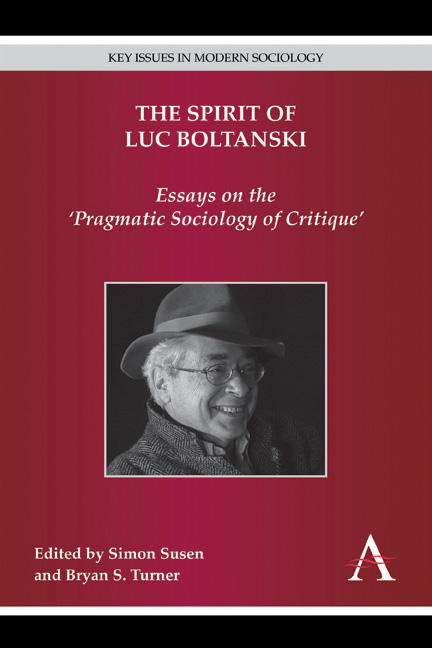Book contents
- Frontmatter
- CONTENTS
- List of Contributors
- Preface
- Part I Introductory Remarks
- Part II Luc Boltanski and (Post-) Classical Sociology
- Part III Luc Boltanski and Pragmatism
- Part IV Luc Boltanski and Critique
- Part V Luc Boltanski and Critical Sociology
- Part VI Luc Boltanski and Political Sociology
- Part VII Luc Boltanski and Contemporary Issues
- Part VIII Luc Boltanski in Conversation
- 22 An Introduction to ‘“Whatever Works”: Political Philosophy and Sociology – Luc Boltanski in Conversation with Craig Browne’
- 23 ‘Whatever Works’: Political Philosophy and Sociology – Luc Boltanski in Conversation with Craig Browne
- 24 Sociology of Critique or Critical Theory? Luc Boltanski and Axel Honneth in Conversation with Robin Celikates
- 25 The Fragility of Reality: Luc Boltanski in Conversation with Juliette Rennes and Simon Susen
- Part IX Luc Boltanski and His Critics
- Index of Names
- Index of Subjects
25 - The Fragility of Reality: Luc Boltanski in Conversation with Juliette Rennes and Simon Susen
from Part VIII - Luc Boltanski in Conversation
Published online by Cambridge University Press: 05 December 2014
- Frontmatter
- CONTENTS
- List of Contributors
- Preface
- Part I Introductory Remarks
- Part II Luc Boltanski and (Post-) Classical Sociology
- Part III Luc Boltanski and Pragmatism
- Part IV Luc Boltanski and Critique
- Part V Luc Boltanski and Critical Sociology
- Part VI Luc Boltanski and Political Sociology
- Part VII Luc Boltanski and Contemporary Issues
- Part VIII Luc Boltanski in Conversation
- 22 An Introduction to ‘“Whatever Works”: Political Philosophy and Sociology – Luc Boltanski in Conversation with Craig Browne’
- 23 ‘Whatever Works’: Political Philosophy and Sociology – Luc Boltanski in Conversation with Craig Browne
- 24 Sociology of Critique or Critical Theory? Luc Boltanski and Axel Honneth in Conversation with Robin Celikates
- 25 The Fragility of Reality: Luc Boltanski in Conversation with Juliette Rennes and Simon Susen
- Part IX Luc Boltanski and His Critics
- Index of Names
- Index of Subjects
Summary
Luc Boltanski is a sociologist and Directeur d'études at the École des Hautes Études en Sciences Sociales. Born in 1940, he is the author of 15 books, which are based on various field studies and transcend disciplinary boundaries: nursing, reproduction, abortion, the professional world of cadres, humanitarian issues, and management – to mention only a few of the topics covered in his works. His sociology focuses on the analysis of normative orders and resources mobilized by human actors in order to preserve, or challenge, particular sets of social arrangements. As reflected in the debates sparked by his ‘pragmatic turn’, the conceptual tools that Boltanski has developed in his numerous studies have had a profound impact upon contemporary sociology – both in France and beyond. His intellectual trajectory is shaped by doubts, methodological revisions, and theoretical shifts, illustrating that Luc Boltanski is a sociologist who is attentive to the construction processes and uncertainties of social life.
Mouvement: Since the 1980s, the kind of sociology that you have endorsed has been characterized as ‘pragmatic’. In On Critique you use this term to refer to the orientation of the individual and collective works that have been produced by members of the Groupe de Sociologie Politique et Morale (GSPM), of which you are the founder. Has linguistic pragmatism been an important source of inspiration in your work?
Luc Boltanski: To begin with, I would like to stress that the notion that our project can be characterized as ‘pragmatic sociology’ is a view that, initially, has been expressed not by members of the GSPM – and, above all, not by me – but by people outside our research group. Personally, I have never sought to identify my empirical studies with a particular – clearly defined – theoretical approach. Rather, I conceive of theoretical work as a never-ending endeavour, whose flaws should by no means be concealed.
- Type
- Chapter
- Information
- The Spirit of Luc BoltanskiEssays on the 'Pragmatic Sociology of Critique', pp. 591 - 610Publisher: Anthem PressPrint publication year: 2014

